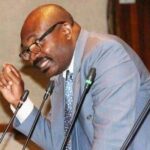By DARLINGTON CHILUBA
WHEN technocrats are summoned to appear before Parliamentary Committees, the public is exposed to how the vast bureaucracy of government operates.
Senior civil servants are, sometimes, made to answer questions about events that occurred before they joined a particular Ministry or Government agency.
It is a difficult and daunting task for anyone and somehow, they answer as aptly and as professionally as they can under pressure.
What the public often underplays is the principle of government continuity exercised by the technocrats. For them, the business of government does not operate according to electoral cycles that dictate political goals. To the technocrat, government business is seamless and unending.
Politicians are different. Firstly, they are directly answerable to the electorate and for a limited period. Secondly, they are not the only choice available to represent their specific domain and thirdly, people demand results too soon, sometimes.
This can either create a panic politician who must blame the world; or a performer who overcomes obstacles. From an institutional standpoint, it makes the connection between Legislature and Bureaucracy a focal point of checks and balances.
The Legislature carries the electoral mandate and thus the “mind” of their constituents to move the country as whole in a certain direction. Thus, the National Assembly, in its high nobility, cannot function if the House is concerned with individual battles of its members than the nation.
If that happens, the mind of the nation will not assemble to discuss progress, the end result may not be the survival or progress of country, but of persons.
Inevitably, this may cause politics and its survival tendencies to spill over into the bureaucracy. Once the politics of blame take root, the national mindset is displaced.
For example, no single politician, alive or otherwise will ever claim ownership (or leadership) over the Structural Adjustment Programme (SAP) of the 1990s.
The national mindset and memory is that the SAPs caused untold misery and it is safer to blame than explain. Resultantly, the national mind is denied the opportunity to make quality enduring decisions and overlook politics.
It is safer for politicians to claim leadership over policies like the Heavily Indebted Poor Countries (HIPC) because the benefits are easier to explain and tangible. The truth is both programmes were done in the 1990s and SAP made way for HIPC to be possible between 1991 and 2000.
Evidence indeed shows that SAP spearheaded the removal of exchange controls and the floating of the Kwacha to the extent of not arresting citizens for holding foreign currency. It also detailed the removal of military personnel from every sphere of the civil service to allow for an efficient, educated, modern, professional and service-oriented bureaucracy.
SAP also oversaw the removal of quantitative restrictions on imports and exports thus allowing individuals and businesses to import (see among others https://www.imf.org/external/np/pfp/1999/zambia/). The changes were far reaching and had some negative outcomes.
Overall, SAP as, a World Bank Programme made HIPC possible beginning in 1996 and is the cornerstone for the current informed and modern civil service, not to mention the open economy we now enjoy.
However, when such critical history is misrepresented by politics, the national mindset is geared towards confrontation and being selective. It is here we must acknowledge that part of the intrinsic weakness of democracy is the potential to ignore and override (the) minority opinion. The addiction to the word majority and the belief that majority means correct, can equally be misleading. This is why Parliament must always have opposition members.
A progressive Legislature needs the Bureaucracy to action political ideas and intentions (manifestos) for the benefit of the country. More than that, the Bureaucracy is essential to reach and manage national resources equitably even for the benefit of vulnerable citizens unable or unwilling to vote. It is here that the reality of policy and leadership is tested.
The Constituency Development Fund (CDF), initiated under the Government and Presidency of Dr Frederick Chiluba in the 1990s captured that spirit of unity between Legislature and Bureaucracy because it overlooked party or political affiliation, or regional heritage and focused on the citizen as the ultimate beneficiary. The CDF has since grown into a full-fledged funded programme.
In a one-party state, the Legislature represents the mind and intentions of the leader to the people. A democracy operates in the opposite way, the mind of the people is communicated to the leaders for their response and action.
Article 6 (61) of the Amended 2016 Constitution of Zambia which deals with the Legislature begins this way: “The legislative authority of the Republic derives from the people of Zambia…and promotes the democratic governance of the Republic.” This means that the Legislature (National Assembly/ Parliament) and the Bureaucracy (the Government) do not exist for themselves, but for the people.
In the words of the founding father of our Democracy, “for every liberty enjoyed there must be a corresponding obligation and responsibility.” In other words, for every vote cast in the spirit of liberty and freedom as a citizen, the Legislature and the Bureaucracy must shoulder the responsibility of keeping the national mindset on unity than division, on responsibility than blame.
Politics by its nature can divide us, but the soul of the nation, the mind, must be kept sacred by these institutions.








